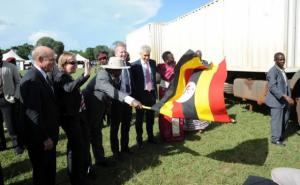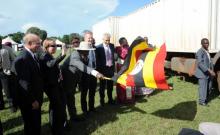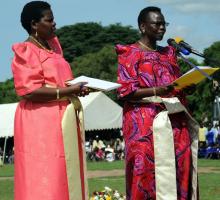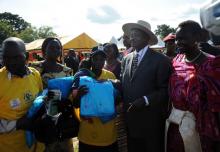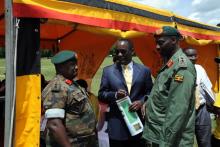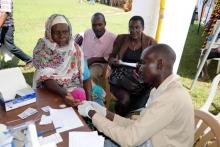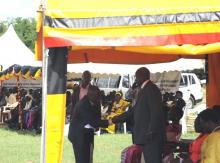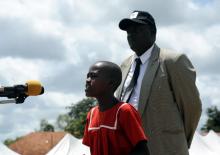President Museveni commends WHO during World Malaria Day commemoration
The President of the Republic of Uganda His Excellency General Yoweri Kaguta Museveni has praised the World Health Organisation for the support given to the country over the years.
“I thank WHO because they have always been with us in all these struggles,” said the President as he officially launched the distribution of Long Lasting Insecticide Treated Nets (LLINs) during the commemoration of the 6th World Malaria Day held at Soroti Sports ground on 10th May 2013.
President Museveni directed the army to join in the distribution of the nets warning that no theft or misappropriation of the nets will be tolerated. He said that the distribution will be handled under the “operational code of conduct” of the army where offenders whether civilians or technocrats will be dealt with like soldiers.
The distribution of 21 million nets is the largest of its kind in the world in 2013. If it is successfully implemented and people sleep under the net, it is estimated that over 53,000 malaria related deaths among children under five years will be prevented.
Global Fund to fight AIDS, Tuberculosis and Malaria, the United Kingdom Government’s Department for International Development, the U.S. President’s Malaria Initiative and World Vision contributed for the purchase of nets and operational cost for distribution.
Overall, President Museveni advised Ugandans to do seven things in order to remain healthy and contribute to the development of the country. These include immunization for all children, hygiene by all people, proper nutrition, behaviour change especially for HIV/AIDS, vector control, use clean safe water and seek prompt treatment of sickness. He requested the Ministry of Health and other leaders to always carry those messages to the people.
At the same function, the Minister of Health Dr Christine Ondoa reported that malaria was killing about 100,000 people in Uganda annually and causing significant economic losses. She said the disease is also responsible for school absenteeism and discouraging foreign investors.
Dr Ondoa assured Ugandans that all the nets had been inspected and tested by the National Medical Stores and the Uganda National Bureau of Standards and were found safe and of good standards.
She appealed to all Ugandans to sleep under LLINs every night.
Speaking at the same function, the WHO Country Representative Dr Wondimagegnehu Alemu in a speech read by Dr Solomon Fisseha commended the government of Uganda for demonstrating through the launching of the 21 million LLINs that the big push initiative is possible if partners work together under the leadership of government. At the conclusion of this campaign, every Ugandan will be assured of sleeping under a net.
He added that since 2000, malaria mortality rates have fallen by more than 25% and 50 out of the 99 countries with ongoing transmission are now on track to meet the 2015 World Health Assembly target of reducing incidence rates by more than 75%. “A major scale-up of vector control interventions, like use of ITNs together with increased access to diagnostic testing and quality-assured treatment, has been key to this progress” he said.
He thanked H.E the President for prioritizing malaria control in Uganda for his personal commitment in spearheading the fight against malaria. . He also pledged WHO’s support to ensure the distribution plan is fully realized in the coming months and in the scaling up of other interventions so as to contribute towards the attainment of the MDGs.
The Director General of Health Services Dr Jasensasib [at] ug.afro.who.intne (Jasensasib[at]ug[dot]afro[dot]who[dot]intne) Ruth Aceng highlighted four strategies Uganda is implementing to achieve the goals of the National Malaria Control Strategic Plan of reducing morbidity due to malaria by 75% and mortality by 80% by 2015.
The first is Indoor Residual Spraying conducted in 10 districts of northern Uganda. This, Dr Aceng said, “has reduced malaria prevalence from 63% in 2009 to less than 10%”.
The other strategy is use of Long lasting Insecticide Treated Nets under which 7.2 million were earlier distributed to pregnant women and children under 5 years. “This resulted in an increase of household ownership of at least one net from 47% in 2009 to 60% in 2011 Dr Aceng reported.
Additionally, small scare mosquito larva control efficacy and safety trials have been going on Wakiso and Nakasongola districts. According to Dr Aceng the Ministry of Health plans full blown implementation next financial year in Kampala city and in Jinja and Mbale municipalities.
Case management is the other strategy and Dr Aceng reported that a total of 19.1 million Rapid Diagnostic Test (RDT) kits are widely available for parasite based diagnosis of malaria. Artemesinin Combination Therapy (ACTs) are available in the country since 2011 which has increased access to affordable treatment from 25% to 60% and patients who receive treatment within 24 hours has increased to 70% due to the work of the Village Health Teams and availability of ACTs in health facilities.
Finally, there are over 300 on-going studies in Uganda aimed at generating evidence for policy development to improve malaria control and prevention. With above interventions, “we are optimistic that the number of lives lost to malaria related causes will reduce from the 300 people per day” she concluded.
Other speakers included representatives of Global Fund, DFID, PMI and the USA Deputy Ambassador to Uganda. Malaria services were provided at the function in addition to dissemination of messages through songs and drama.
_________________________________________________________________
For more information please contact
Benjamin Sensasi, Health Promotion Advisor, WHO Country Office
Tel: 256-41-334400
Email: sensasib [at] ug.afro.who.int (sensasib[at]ug[dot]afro[dot]who[dot]int)



